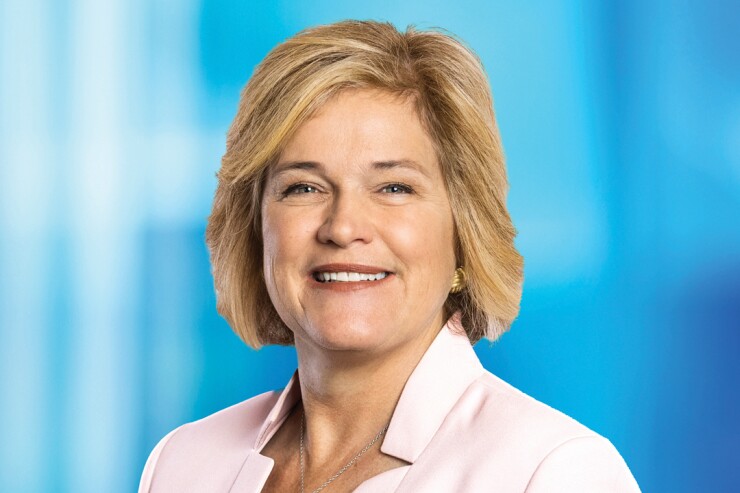When Jenny Johnson took the reins as president and CEO of global asset manager Franklin Templeton in 2020, some observers were surprised to see her leading in a different direction than her family members had in the past.
"Many people expected me to run the company the same way as my brother did," Johnson said onstage Tuesday at American Banker's
Johnson, who was ranked this year as
Johnson discussed her vision for the short-term and long-term future of portfolio management, and warned of further potential economic fallout from the recent spate of interest rate hikes, in a keynote fireside chat at the conference with American Banker's editor-in-chief, Chana Schoenberger.

Asked for her thoughts on the future of the industry, Johnson said the two biggest trends she's noticed are technologies enabling personalization for investors and a move towards alternatives, in particular private credit.
With more customers in financial services demanding personalization, financial advisors are now able to tailor portfolios to clients' interests and values with strategies like direct indexing, Johnson said. That can come through prioritizing gender diversity in portfolios, for example, or investing in companies with net-zero emissions to address climate change concerns, she said.
Johnson was optimistic about other innovations such as blockchain technology, into which her firm has waded. Leaving aside Bitcoin, which Johnson called a "distraction" from conversations about blockchain, technologies like smart contracts could add value by removing "frictional cost" out of traditional, slower banking transactions. Blockchain can also get younger next-generation consumers "excited" about personal finance, helping them start to save and invest, she said.
Johnson said her firm has also grown its presence in private credit because traditional financing for companies that go public is now harder to come by than it was at the start of the millennium. Since the 2008 financial crisis, banks had become more cautious about lending, she said: "They don't want to use their capital for just everybody. Their capital is so expensive and precious."
Not all companies want to go public, she said: the higher interest rate environment of the past year and a half also made borrowing from banks more expensive. And going public adds pressure on CEOs to deliver on quarterly earnings, even though it might take several years for them to realize the benefit of a new investment in their business. "Companies need the ability to stay private," she said.
"So are we moving toward a place where most of this financing is done privately?" Schoenberger asked.
Johnson referenced

She credited the Federal Reserve for stepping in immediately to protect depositors' funds at the failed regional banks of the spring. But the Fed's unprecedented rapidity of hiking interest rates in the past 18 months had created "unintended consequences," the effects of which are still playing out, and laid bare the vulnerability of the entire banking system to sudden depositor flight. "There is not a bank out there who could have withstood 40% of their deposits being withdrawn in one hour… JPMorgan Chase would have a problem," she said, pointing to the largest bank in the country.
One of those lingering consequences, Johnson said, was potentially tying the hands of the Federal Reserve when it came to bringing rates back down. "I think you're going to see another 25 basis point increase," she said.
The ballooning size of the country's debt — which
"I do worry. This is a longer term story, but it could end up making it more difficult for us to reduce rates, if we are going to have to attract more and more buyers" of U.S. debt, Johnson said.






